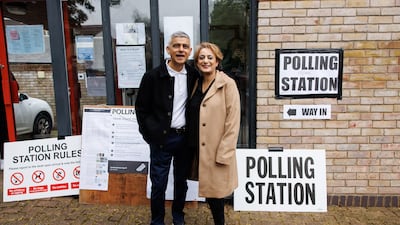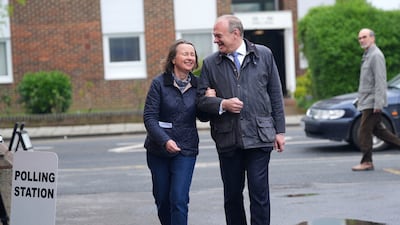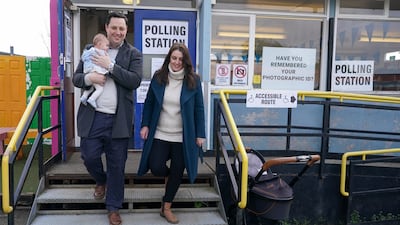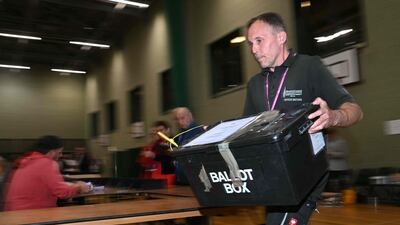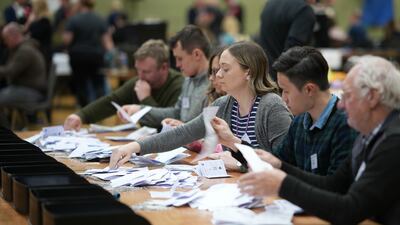Labour’s elation at thumping the Conservatives in the England and Wales local elections has been tempered by concern that it is losing key voter blocs, particularly in Muslim communities, over its stance on the Israel-Gaza conflict.
Labour's attempt to unseat the West Midlands Conservative mayor Andy Street was reportedly hampered by a suppressed vote for the party in previously loyal districts as an independent candidate performed surprisingly well.
There was speculation on Friday that London’s mayor, Sadiq Khan, could face a very tight result against his Tory rival Susan Hall. One factor counting against him was anger at the Labour leadership's failure to swiftly call for a Gaza ceasefire or criticise Israel's actions.
With the London mayoral result expected on Saturday afternoon, and Muslims making up 15 per cent of the electorate, a close outcome in what had been seen as a foregone conclusion would prove damaging.
“We do recognise the strength of feeling that there is and, of course we will continue to work just as we do in every area across the country to earn votes back in future,” said shadow home secretary Yvette Cooper
“We do strongly recognise there are areas where we have had independent candidates who have been particularly strongly campaigning on Gaza and where there is really strong feeling about this issue, because tens of thousands of people have been killed.”
Nationwide, the more significant harm was done to Prime Minister Rishi Sunak’s party who faced significant losses across the local council elections, although they are unlikely to be dire enough for a serious leadership challenge.
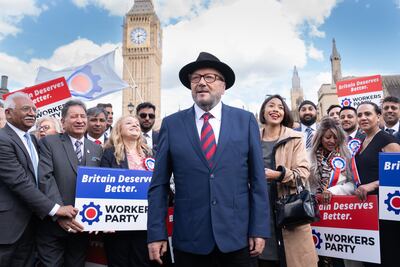
Gaza rift
There is also growing evidence that Labour leader Keir Starmer’s policy on Israel is having an impact on communities outside London.
This was most apparent in the Greater Manchester town of Oldham, which is 22 per cent Muslim, where Labour unexpectedly lost control of the local council. Earlier this year several councillors quit the party over its position on Gaza.
“I said Keir Starmer would pay a high price for his betrayal on Palestine, today is the start of that,” said George Galloway, the recently elected pro-Palestinian Workers Party MP for Rochdale.
The Workers Party is also likely to scupper Labour in the West Midlands mayoral race. Muslim voters have apparently heavily backed Akhmed Yakoob, who Mr Galloway said “may have cost Labour the mayoralty”.
Engage better
Pat McFadden, Labour’s campaign co-ordinator, admitted that the Middle East crisis “had been a factor” in their polling and there “wasn't any point in denying that”.
“It does get raised, and I understand why people have strong feelings about that,” he told the BBC.
Polling analyst Chris Hopkins told The National that it “would be wrong” to underestimate the impact of alienating some voters.
“There are some lessons for Labour to learn here, in that they need to engage better with the grumbling within this community because they will lose votes,” said Mr Hopkins, the director of Savanta.
“There is dissatisfaction with the party and how they've handled the Muslim community.”
There is now growing concern within Labour that the Gaza war will split their vote in the autumn’s general election and cost them seats.

Take heed, Joe
The stay-at-home Muslim vote in Britain could well be repeated in America and have a critical role in deciding who becomes the next US president.
The key swing state of Michigan, which has an Arab-American population of nearly three per cent, could impact on President Joe Biden’s tally if voters do not turn out, something seen as increasingly likely following the pro-Palestinian university protests.
Saved Rishi’s skin
Mr Sunak can draw some hope after the Conservatives retained the mayoralty of Tees Valley in north-east England and did not come third to the right-wing Reform UK party in the Blackpool South parliamentary by-election.
However, some analysts described the results as an “electoral death sentence” for Mr Sunak, with Blackpool showing a swing of 26 per cent to Labour as it took the seat from the Tories.
“The swing against the Conservatives would be large enough for all of their MPs in that region to lose their seats in the next election,” said Mr Hopkins.
But Ben Houchen holding on to the mayoralty in Tees Valley had “saved Rishi’s skin” and demonstrated that some incumbent candidates could resist “the pretty strong headwinds blowing against the Conservatives”, he added.

Rishi’s leadership woes
Tory sources suggested that they would take stock of the results over the weekend, with two more mayoral results coming on Saturday, before deciding whether to submit letters of no confidence in Mr Sunak.
If the total reaches 53, out of the current 345 Conservative MPs, then the prime minister will face a confidence vote in his leadership which is likely to be politically fatal.
Waiting in the wings is Penny Mordaunt who, despite denying she wishes to challenge Mr Sunak, is being spoken of as an “emergency” prime minister.
That view was publicly endorsed by former chancellor Kwasi Kwarteng on Friday stating that she would make “a good leader”.
The results still point to a severe Conservative general election defeat, yet Mr Sunak can take hope that his Rwanda deportation scheme and an improving economy might give him the slimmest hope of miraculously turning his fortunes around.

